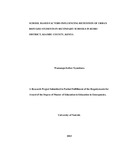| dc.description.abstract | Secondary school for urban refugee students is a basic right, one that is vital in
restoring hope and dignity to people driven from their countries. It helps them to
get back on their feet and build back a better future. However a review of related
literature shows that secondary education for urban refugee students is marred
with retention issues. This has been attributed to such factors as limited
professional training and support to secondary school teachers to meet the
academic, psychosocial and emotional needs of urban refugee students, poor
sense of belonging and unaddressed emotional and psychosocial problems among
urban refugee students. This study attempts to investigate school based factors
influencing retention of urban refugee students in secondary schools in Ruiru
District, Kiambu County, Kenya. The objectives of the study were: First, to
examine the extent to which teacher attitude influences retention of urban refugee
students in secondary schools, secondly, to establish the extent to which host
students attitude influences retention of urban refugee students, thirdly, to
determine the extent to which the Kenyan secondary school curriculum
influences retention of urban refugee students and finally to establish the extent to
which the cost of secondary education influences retention of urban refugee
students .The study adopted descriptive survey design. Participants were selected
using purposive and simple random sampling. The study sampled 7 principals, 80
teachers, 100 urban refugee students and 576 host students. The study employed
open and closed questionnaires as well as focus group discussions with urban
refugee students. To ensure reliability of the research instruments, a pilot study
carried out in one school with 1 principal,4 teachers ,5 urban refugee students and
5 host students. The research instruments were administered twice to cater for
pretesting ahead of the main data collection. The pilot study data were computed
using the Pearson product moment correlation coefficient. Data was analyzed
qualitatively and quantitatively. It was presented using frequency tables and
percentages. The major research findings were that the school based factors
influencing retention of urban refugee students in secondary are discrimination,
lack of school fees bullying, extortion, low achievement levels, language
problems rigid teaching methods and curriculum and lack of training for teachers
and principals on how to handle urban refugee students
The major research conclusions are that lack of school fees, discrimination
extortion, rigid curriculum and teaching methods and lack of training for teachers
and principals on how to handle urban refugee students to a great extent
influenced retention. The major recommendation for this study is that teacher and
school principals should be trained on how to handle urban refugee students.
Also, teachers should adopt to the needs of urban refugee students through
inclusive and flexible curriculum and teaching methods. The major suggestions
for further studies are studies on the influence of curriculum on academic
achievement of urban refugee students as well as non school related factors
influencing the dropout rates of urban refugee students | en |

